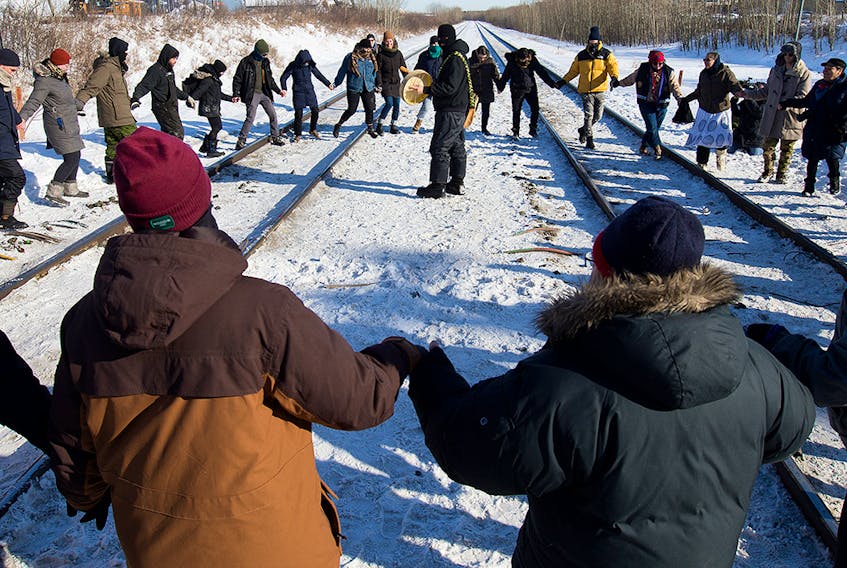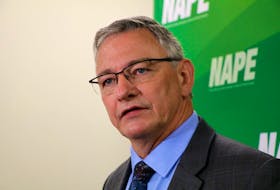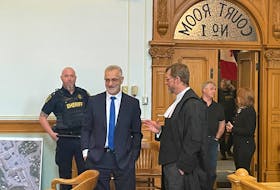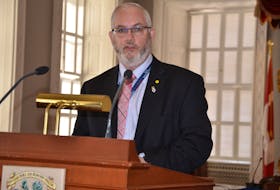OTTAWA — Conservative leadership candidate Erin O’Toole says that as prime minister, he would introduce legislation to designate ports and major railways, highways and bridges as critical national infrastructure and make it a criminal offence to block them, even without a court injunction.
He says he also would declare a general policy that police should clear blockades quickly so they don’t grow to the point where “clearing them risks violence.”
“Peacefully protesting is a key type of speech that our government must protect,” said the statement from the O’Toole campaign, released Thursday morning. “Intimidation and physically preventing people from going about their lives is different. It is a form of common law assault and should, in the appropriate situations, be treated as such.”
The detailed plan from O’Toole comes as his main rival Peter MacKay amended his own stance on the blockades that have recently shut down multiple rail lines. On Wednesday night MacKay deleted his tweet from hours earlier supporting counter-protesters in west Edmonton who took down a rail blockade. The tweet, which said MacKay was “glad to see a couple Albertans with a pickup truck can do more for our economy in an afternoon than Justin Trudeau could do in four years,” had been criticized as supporting vigilantism.
MacKay replaced it with a series of late-night tweets that took a more nuanced position, supporting the “peaceful removal of debris deliberately placed on a railway that posed a threat to public safety,” and noting the counter-protesters said they weren’t being violent.
His campaign released a statement Thursday afternoon saying that both “illegal blockades and vigilante reactions by those frustrated by the Prime Minister’s inaction are dangerous.”
In a fundraising email to supporters, MacKay said he made a “mistake” in how he phrased his initial reaction. “To be truthful, I’m not glad,” he wrote. “I’m sad because our prime minister has left Canadians feeling like the law, the police and the government aren’t on their side.”
In O’Toole’s plan, he also puts the blame on Prime Minister Justin Trudeau for the blockades that have gone up in support of Wet’suwet’en protesters of a natural gas pipeline. The Wet’suwet’en protests were sparked after the RCMP began enforcing a B.C. court injunction allowing for pipeline construction to go forward.
“The Liberals are the party that began the Shut Down Canada culture by cancelling pipelines, banning tankers and bringing forward Bill C-69 over the objections of a majority of provinces,” O’Toole’s statement said. “The illegal blockaders took their cues from the Trudeau Liberals.”
He went on to say the blockades are due to Trudeau’s “weakness and indecision,” saying the prime minister has “made it crystal clear that he will not stand up for the rule of law but will instead bow down to those who want to shut down our economy.”
O’Toole said his plan is meant to “get our economy moving and ensure that any group with a grievance will not be able to shut it down again at a moment’s notice.”
He said that as prime minister he would introduce legislation called the Freedom of Movement Act. It would declare inter-provincial railways, ports, the national highway system and inter-provincial and international bridges “as Critical National Infrastructure to make it clear that the federal government takes responsibility for keeping them open.”
It would also make it a criminal offence “to block a railway, airport, port or major road, or to block the entrance to a business or household in a way that prevents people from lawfully entering or leaving.”
The legislation would allow police to clear a blockade even without an injunction. “Organizations should not have to wait for the courts and then see them ignored or have to endure more intimidation and loss before an injunction is enforced in order to simply continue operating legally.”
For such legislation to stand up, the courts would have to find it is compatible with the Charter of Rights and Freedoms. It would also still ultimately rely on the police making an operational decision to take down the blockade. Currently, many of the blockades are already considered illegal and the courts have quickly granted injunctions to remove them. Despite the injunctions, police in some jurisdictions have been hesitant to do so, not wanting to escalate the situation.
He also promised to “amend the tax code to remove charitable status from any group that has accepted foreign funds and has engaged in action related to the offences outlined above for blockading critical public infrastructure.”
Finally, O’Toole said he would work to “improve trust between Indigenous communities and law enforcement by creating and funding a specialized RCMP Aboriginal Liaison Officer position,” as well as a pilot program to “deploy these specialized officers to communities that have high levels of off-reserve Aboriginal populations and/or a high number of missing or murdered Indigenous women cold cases.”
• Email: [email protected] | Twitter: btaplatt
Copyright Postmedia Network Inc., 2020









